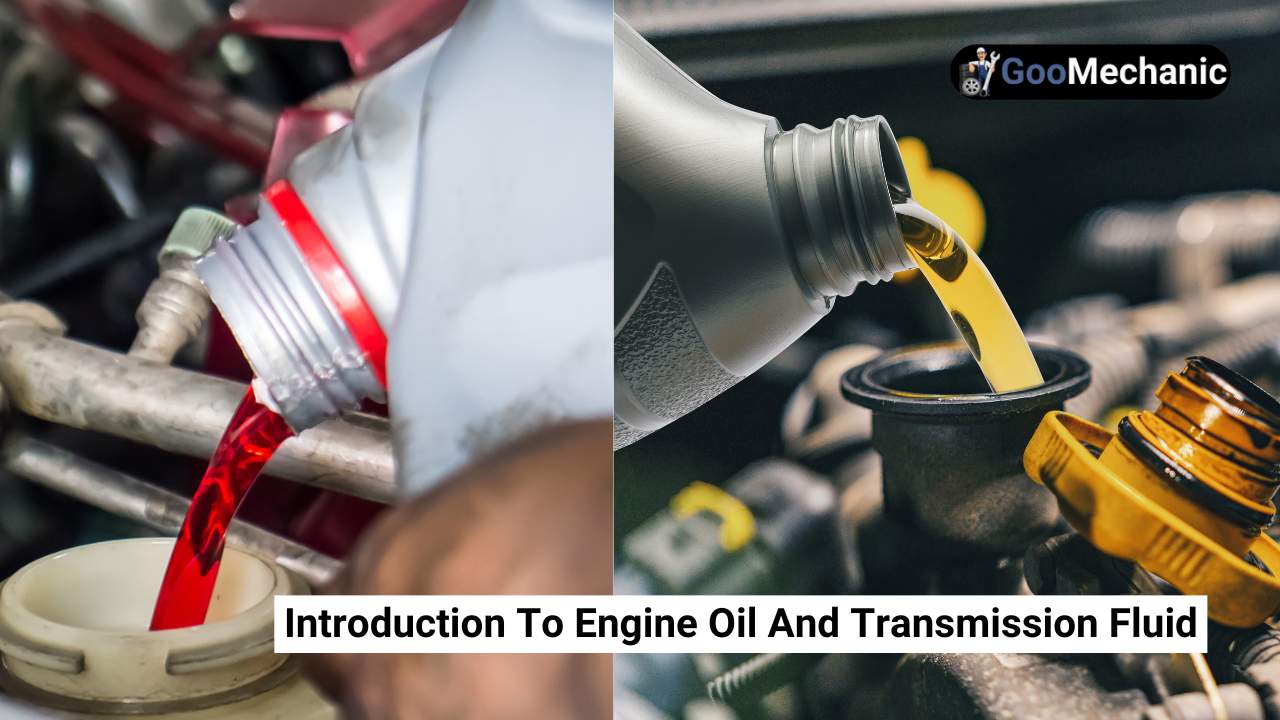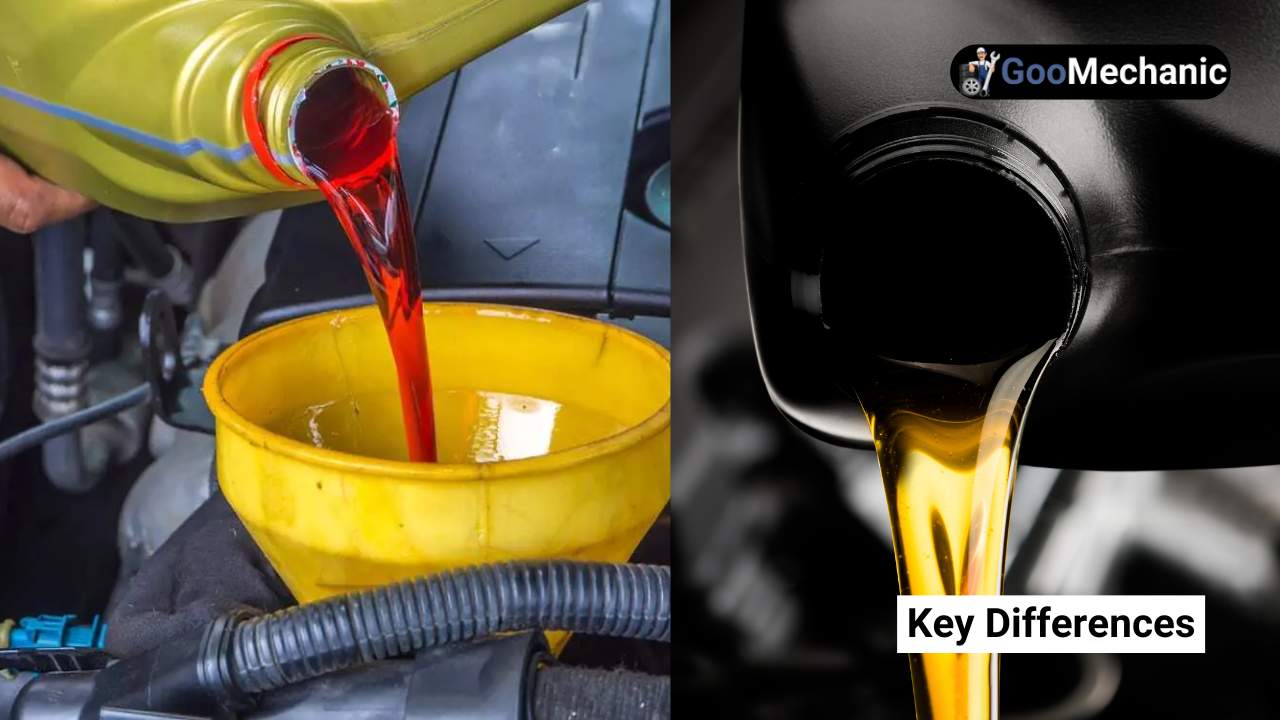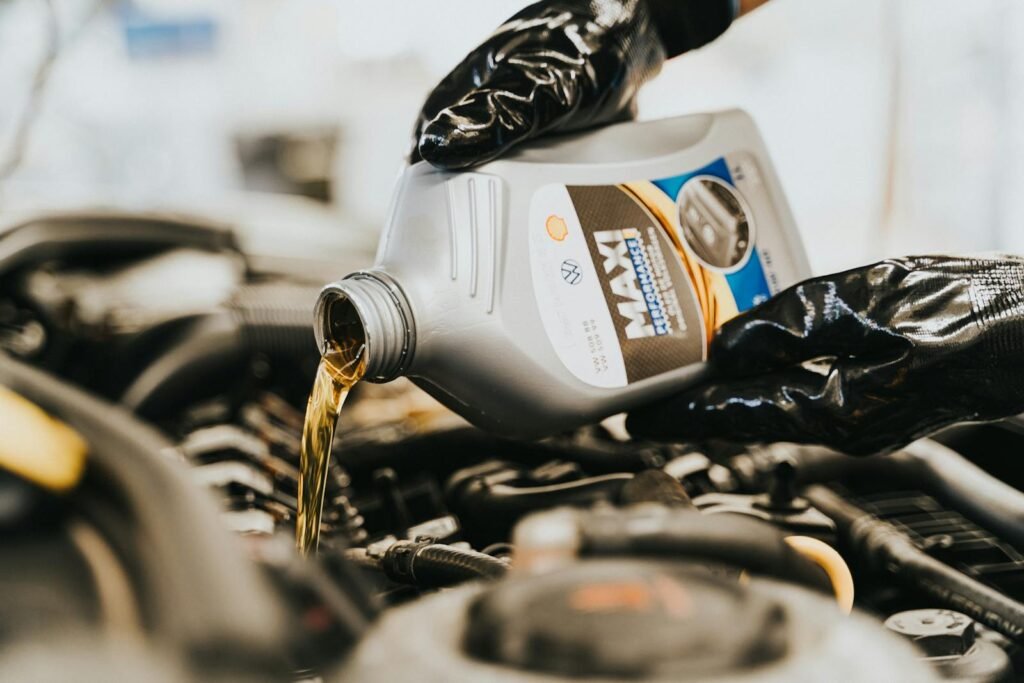Engine oil and transmission fluid are not the same. Engine oil lubricates the engine, while transmission fluid lubricates the transmission.
Engine oil and transmission fluid serve distinct purposes in a vehicle. Engine oil primarily lubricates and cools the engine components, ensuring smooth operation and preventing wear and tear. Transmission fluid, on the other hand, lubricates the gears and hydraulic systems within the transmission.
This fluid also helps with cooling and ensures efficient power transfer from the engine to the wheels. Using the correct type of fluid for each system is crucial for maintaining vehicle performance and longevity. Always check your vehicle’s manual to ensure you are using the recommended fluids to keep your car running smoothly.
Introduction To Engine Oil And Transmission Fluid
 Engine Oil And Transmission Fluid” width=”1280″ height=”720″ />
Engine Oil And Transmission Fluid” width=”1280″ height=”720″ />
Many people think engine oil and transmission fluid are the same. They are not. Both are crucial for your vehicle. They serve different purposes. Knowing the differences helps in vehicle maintenance.
Purpose Of Engine Oil
Engine oil keeps the engine parts moving smoothly. It reduces friction. It helps in cooling the engine. It prevents wear and tear. Engine oil also keeps the engine clean. It traps dirt and debris.
- Reduces friction
- Cools the engine
- Prevents wear and tear
- Keeps the engine clean
Purpose Of Transmission Fluid
Transmission fluid lubricates the gears. It ensures smooth shifting. It cools the transmission system. It transfers power from the engine to the wheels. It also prevents gear slippage.
- Lubricates gears
- Ensures smooth shifting
- Cools the transmission system
- Transfers power to wheels
- Prevents gear slippage
| Aspect | Engine Oil | Transmission Fluid |
|---|---|---|
| Primary Function | Lubricates engine parts | Lubricates transmission gears |
| Cooling | Cools the engine | Cools transmission system |
| Power Transfer | No | Transfers power to wheels |
Key Differences

Understanding the key differences between engine oil and transmission fluid is crucial for vehicle maintenance. Both fluids play vital roles but serve distinct purposes. Let’s dive into the primary differences.
Composition
Engine oil is made from a blend of base oils and additives. These additives help in reducing friction, cleaning, and cooling the engine. The base oils can be synthetic or mineral-based.
Transmission fluid also contains base oils and additives. But, its composition is designed for different functions. It includes anti-wear agents, detergents, and friction modifiers. The base oils are usually higher in viscosity compared to engine oils.
Function
The main job of engine oil is to lubricate the engine’s moving parts. It also helps in cooling the engine and removing dirt and sludge. Proper lubrication ensures the engine runs smoothly and efficiently.
Transmission fluid lubricates the moving parts within the transmission. It also acts as a hydraulic fluid, helping in gear shifts. This fluid ensures the transmission system operates smoothly and extends its life.
Types Of Engine Oil

Choosing the right engine oil is crucial for your vehicle’s performance. There are two main types of engine oil: Conventional Oil and Synthetic Oil. Each has its own benefits and uses.
Conventional Oil
Conventional oil is the most common type of engine oil. It is derived from crude oil and refined to meet industry standards. This type of oil is suitable for most standard driving conditions and older vehicles. It is also more affordable than synthetic oil.
- Benefits:
- Cost-effective
- Widely available
- Good for standard engines
- Drawbacks:
- Breaks down faster
- Less effective in extreme temperatures
- Requires more frequent changes
Synthetic Oil
Synthetic oil is engineered in a lab for optimal performance. It offers superior lubrication and protection for your engine. Synthetic oil is ideal for high-performance and modern engines.
- Benefits:
- Longer-lasting
- Better performance in extreme conditions
- Improved engine protection
- Drawbacks:
- More expensive
- Not always necessary for older cars
Here’s a quick comparison:
| Feature | Conventional Oil | Synthetic Oil |
|---|---|---|
| Cost | Lower | Higher |
| Longevity | Shorter | Longer |
| Performance | Good | Superior |
| Temperature Tolerance | Moderate | High |
Choosing the right type of engine oil depends on your vehicle’s needs. Consider factors like your driving conditions and the age of your car.
Types Of Transmission Fluid
Transmission fluid is essential for smooth vehicle operation. Not all transmission fluids are the same. Different types cater to specific transmission systems. Let’s explore the main types of transmission fluid.
Automatic Transmission Fluid
Automatic Transmission Fluid (ATF) is designed for automatic transmissions. It helps in lubricating, cooling, and cleaning. ATF also works as a hydraulic fluid. This fluid ensures smooth gear shifts. The most common types of ATF include Dexron and Mercon.
| Type | Key Features |
|---|---|
| Dexron | Common in General Motors vehicles |
| Mercon | Used in Ford vehicles |
Using the right ATF type is crucial. Always check your vehicle’s manual.
Manual Transmission Fluid
Manual Transmission Fluid (MTF) is used in manual transmissions. MTF provides lubrication and cooling. It also helps to reduce friction and wear. Manual transmissions need specific fluid types. These include GL-4 and GL-5 gear oils.
- GL-4: Suitable for synchronized manual transmissions
- GL-5: Ideal for high-load conditions
Choosing the correct MTF type ensures your transmission works well. Always refer to your vehicle’s manual for guidance.
Maintenance And Replacement
Maintaining your vehicle involves regularly checking and replacing fluids. Two crucial fluids are engine oil and transmission fluid. Each fluid has its maintenance schedule and replacement requirements.
When To Change Engine Oil
Engine oil lubricates your car’s engine. It helps to reduce friction and wear. Changing the engine oil on time ensures a smooth-running engine.
Most manufacturers recommend changing the oil every 3,000 to 5,000 miles. This can vary based on the type of oil used and driving conditions. Always consult your vehicle’s manual for the recommended interval.
Use the following table to understand the common types of oil and their change intervals:
| Type of Oil | Change Interval |
|---|---|
| Conventional Oil | 3,000 – 5,000 miles |
| Synthetic Oil | 7,500 – 10,000 miles |
| Synthetic Blend Oil | 5,000 – 7,500 miles |
When To Change Transmission Fluid
Transmission fluid is vital for the proper functioning of the transmission. It lubricates the gears and ensures smooth gear shifts.
Transmission fluid doesn’t need frequent changes like engine oil. Most manufacturers suggest changing it every 30,000 to 60,000 miles. Again, refer to your vehicle’s manual for specific guidance.
Here is a quick reference guide:
- Manual Transmission: 30,000 – 60,000 miles
- Automatic Transmission: 60,000 – 100,000 miles
Check the fluid level regularly to avoid costly repairs.
Signs Of Problems
Understanding the signs of problems in engine oil and transmission fluid is crucial. Both fluids are vital for your vehicle’s performance and longevity. Knowing the symptoms of issues can help prevent serious damage.
Engine Oil Issues
Engine oil lubricates the engine and reduces friction. Here are some common signs of engine oil problems:
- Oil Light On: The dashboard oil light indicates low oil levels.
- Dirty Oil: Check the dipstick. Dark or gritty oil means it’s time for a change.
- Engine Noise: Knocking or ticking sounds signal insufficient lubrication.
- Excessive Exhaust Smoke: Blue smoke shows oil burning in the engine.
- Overheating: Low oil levels can cause the engine to overheat.
Transmission Fluid Issues
Transmission fluid lubricates and cools the transmission system. Here are some signs of transmission fluid problems:
- Transmission Slipping: Delayed or erratic shifting signals low fluid levels.
- Grinding or Shaking: Rough shifting indicates potential fluid issues.
- Burning Smell: Overheated transmission fluid can produce a burnt odor.
- Leaking Fluid: Puddles of red or brown fluid under the vehicle show leaks.
- Unusual Noises: Whining or clunking sounds can indicate low fluid levels.
Impact On Vehicle Performance
Understanding the differences between engine oil and transmission fluid is crucial. Each fluid plays a vital role in vehicle performance. Both fluids affect how well the vehicle runs. Let’s explore their impact on vehicle performance.
Engine Efficiency
Engine oil lubricates the engine’s moving parts. It reduces friction and wear. A well-lubricated engine works more efficiently. Better lubrication means less energy wasted. Clean engine oil also helps keep the engine cool.
Dirty or old engine oil can harm performance. It may cause overheating and wear. This can lead to costly repairs. Using the right engine oil ensures peak engine performance. It can also improve fuel efficiency.
Transmission Smoothness
Transmission fluid is vital for smooth gear shifts. It lubricates the transmission system. Smooth shifts improve driving comfort. Old or dirty transmission fluid can cause rough gear changes.
Transmission fluid also helps with cooling. It prevents the transmission from overheating. Using the right type of fluid is important. It ensures optimal performance and longevity.
Below is a comparison of the key roles of each fluid:
| Fluid Type | Main Function | Impact on Performance |
|---|---|---|
| Engine Oil | Lubricates engine parts | Improves engine efficiency |
| Transmission Fluid | Lubricates and cools transmission | Ensures smooth gear shifts |
Using the correct fluids is essential. It helps maintain vehicle performance and longevity. Keep an eye on fluid levels and quality. Regular maintenance can prevent many issues.
Choosing The Right Products
Choosing the right products for your vehicle is crucial. Engine oil and transmission fluid serve different purposes. Using the right products ensures your vehicle runs smoothly. Let’s explore how to select these essential fluids.
Selecting Engine Oil
Selecting the right engine oil is vital for your car’s health. Here are some tips:
- Check the manufacturer’s recommendations in the owner’s manual.
- Consider the climate you drive in. Cold weather needs thinner oil.
- Look for the right viscosity rating, like 5W-30 or 10W-40.
- Choose between synthetic, semi-synthetic, or conventional oil.
Use synthetic oil for high-performance engines. Conventional oil is good for older models.
Selecting Transmission Fluid
Picking the right transmission fluid is equally important. Follow these guidelines:
- Check the owner’s manual for the recommended type.
- Determine if your car uses automatic or manual transmission fluid.
- Look for specific additives that enhance performance.
- Consider the brand and quality. Trusted brands are more reliable.
Automatic transmissions need fluid with specific additives. Manual transmissions use simpler fluids.
| Type | Considerations |
|---|---|
| Engine Oil | Viscosity, Climate, Type (Synthetic, Semi-Synthetic, Conventional) |
| Transmission Fluid | Transmission Type (Automatic, Manual), Additives, Brand |
Choosing the right products can extend your vehicle’s life. Always follow the manufacturer’s guidelines.
Frequently Asked Questions
Can I Use Transmission Fluid For Engine Oil?
No, you cannot use transmission fluid as engine oil. They serve different functions and could damage your engine.
Is There A Difference Between Engine Oil And Transmission Oil?
Yes, there is a difference. Engine oil lubricates engine parts. Transmission oil lubricates the transmission system. Both oils serve specific functions.
Can You Substitute Motor Oil For Transmission Fluid?
No, you cannot substitute motor oil for transmission fluid. They have different properties and functions. Using motor oil can damage the transmission. Always use the recommended transmission fluid for your vehicle.
What Fluid Is The Same As Transmission Fluid?
Automatic transmission fluid (ATF) is similar to power steering fluid. Both fluids lubricate and cool their respective systems.
Conclusion
Understanding the difference between engine oil and transmission fluid is crucial for vehicle maintenance. Each serves a unique purpose and should not be interchanged. Regularly check and maintain both to ensure optimal performance. Proper care of these fluids can extend the lifespan of your vehicle and prevent costly repairs.
Read More: Lubricant Companies in India
